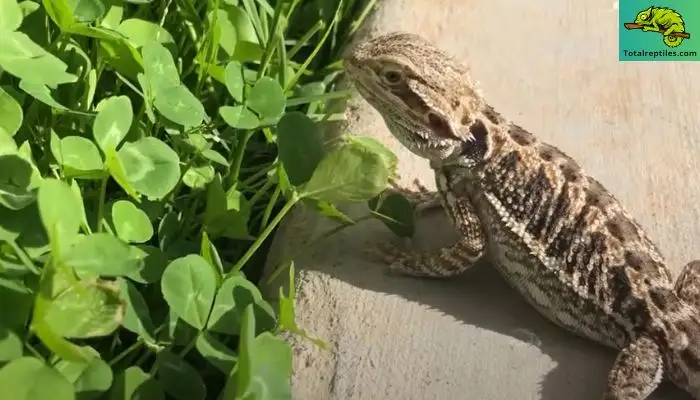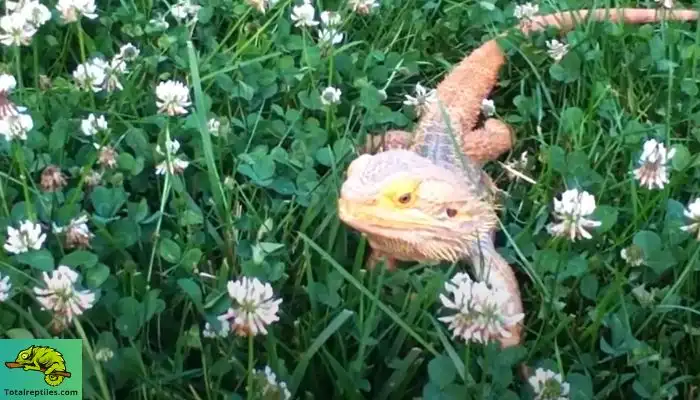Incorporating clovers into a bearded dragon’s diet can be beneficial, but exercising caution and following specific guidelines is essential.
While bearded dragons can consume clovers, avoiding wild varieties is crucial as they may contain harmful substances.
Cultivated clovers offer a range of nutritional benefits for these magnificent reptiles. They are valuable to their diet because they are rich in protein, carbohydrates, and minerals.
Clover is a good source of calcium, which plays a vital role in maintaining a bearded dragon’s overall health.
Since clover contains high levels of nitrogen, its consumption should be limited. Combining clovers with other vegetables and protein sources ensures a well-rounded and healthy diet for your bearded dragon.

Benefits of Feeding Clovers to Bearded Dragons
Bearded dragons can benefit from clover’s nutritional benefits and attractive appearance.
These leafy greens offer a range of essential nutrients, high fiber content, and natural hydration.
Let’s explore the advantages of incorporating clovers into your bearded dragon’s menu.
High Fiber Content:
- Clovers are rich in fiber, which aids in digestion and promotes healthy bowel movements in bearded dragons.
- The fiber content helps prevent constipation and ensures proper gut health for your reptilian friend.
Vitamins and Minerals:
- Clovers are packed with essential vitamins and minerals for a bearded dragon’s overall well-being.
- They are a good source of Vitamin A, which supports eye health and skin integrity.
- These greens also contain Vitamin C, an antioxidant that boosts and aids collagen production.
- Clovers are an excellent source of calcium, phosphorus, and potassium, which support bone health and muscle function.
Natural Hydration:
- Bearded dragons require proper hydration to maintain their health and well-being.
- Clovers have a high water content, providing a natural source of hydration for your reptile companion.
- Including clovers in their diet can help ensure they stay adequately hydrated, especially during warmer months.
Here is a breakdown of some essential nutrients found in 100 grams of clovers:
| Nutrient | Amount per 100g | Potential Health Benefits |
| Calories | 23 | Provides energy for daily activities |
| Protein | 3g | Supports muscle growth and repair |
| Carbohydrates | 3.6g | Supplies energy for bodily functions |
| Fiber | 1.5g | Promotes digestion and prevents constipation |
| Vitamin A | 5,005 IU | Supports eye health and immune function |
| Vitamin C | 51mg | Boosts immune system and collagen production |
| Calcium | 203mg | Promotes bone and teeth health |
| Phosphorus | 35mg | Supports bone and teeth health |
| Potassium | 246mg | Maintains fluid balance and heart health |
How To Feed Clovers To Bearded Dragons – With Precautions
Here’s a guide on how to feed clovers to bearded dragons while ensuring their safety and well-being –

Preparing Clovers for Feeding
- Choose cultivated clovers free from pesticides or chemical treatments. Avoid picking them from the wild, as they may contain harmful substances.
- Thoroughly wash the clovers to remove dirt, debris, or potential residue.
- Depending on your bearded dragon’s preference and size, you can offer whole clover plants or pluck individual leaves for feeding.
Recommended Portion Sizes
- Clovers should be a minor part of a bearded dragon’s overall diet. Aim for a portion that constitutes no more than 10% of their total vegetable intake.
- For young or smaller bearded dragons, start with smaller portions, such as a few leaves or one clover plant. As they grow, you can gradually increase the portion size.
Monitoring the Dragon’s Response
- Observe your bearded dragon’s reaction to clovers. While some bearded dragons enjoy them, others may not show interest or prefer other greens.
- Watch for any signs of digestive issues, such as diarrhea or constipation, as these may indicate that clovers don’t agree with your dragon’s digestive system. If such problems arise, discontinue feeding clovers or reduce the portion size.
Note: Although clovers offer nutritional benefits, they should be part of a varied and balanced diet for bearded dragons. Provide them with vegetables, fruits, protein sources, and occasional live insects as part of their overall meal plan to meet their dietary requirements.
Here are some additional precautions to keep in mind:
- Only feed clovers suitable for human consumption, as some varieties may be toxic to bearded dragons.
- Avoid introducing new foods too quickly. Gradually introduce clovers into your bearded dragon’s diet, allowing them time to adjust and avoid potential digestive issues.
- Always provide fresh water for your bearded dragon to ensure proper hydration.
- If you’re unsure about introducing clovers or have concerns about your bearded dragon’s diet, consult a reptile veterinarian or a herpetologist. They can provide personalized guidance based on your specific bearded dragon’s needs and help ensure a healthy and balanced diet.
Remember, every bearded dragon is unique, and it’s important to monitor their individual response to clovers and make adjustments accordingly.
Can Bearded Dragons Eat Clover Flowers?
Yes, bearded dragons can eat clover flowers. Clover flowers, just like the leaves, can be a part of their diet. They provide similar nutritional benefits as clover leaves, including fiber, vitamins, and minerals.

Ensuring that the clover flowers are free from pesticides or other harmful substances is essential. Thoroughly wash the flowers before offering them to your bearded dragon.
Can Bearded Dragons Eat Clover Sprouts?
Absolutely! Bearded dragons can indeed enjoy the benefits of eating clover sprouts. These tiny, tender plants provide a range of essential nutrients like Vitamin C, A, E, and K, and they also offer a delightful crunchy texture that adds a touch of enjoyment to their meals.
Clover sprouts can be a nutritious and exciting addition to a bearded dragon’s diet, providing a fresh and stimulating experience during feeding time.
Just ensure that the clover sprouts are thoroughly washed before offering them to your dragon, and as always, monitor their response to ensure they tolerate them well.
Final Words
So, while bearded dragons can enjoy clovers, it’s important to exercise caution and follow proper guidelines.
Choose cultivated clovers, wash them thoroughly, and introduce them gradually.
Clovers, including their flowers and sprouts, can be a delightful addition to their meals, providing both nutrition and a satisfying crunch.
Remember, a varied and balanced diet is key for a happy and healthy bearded

